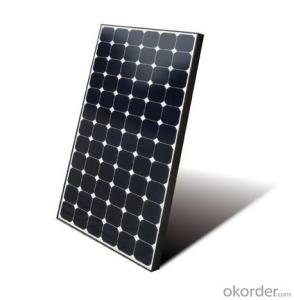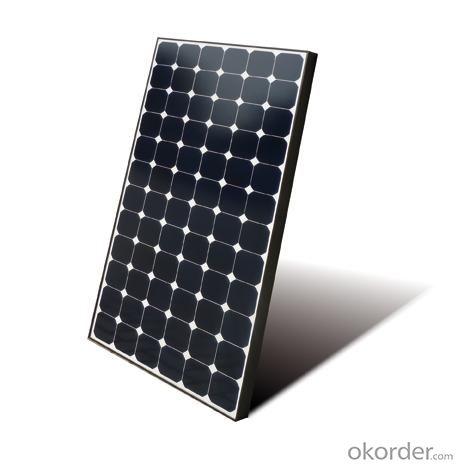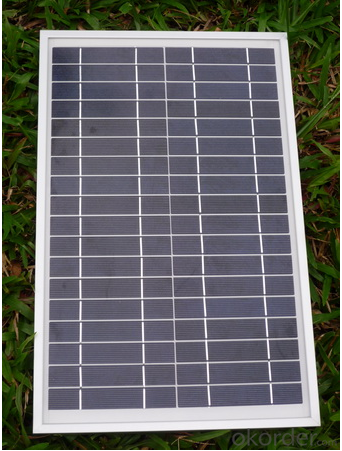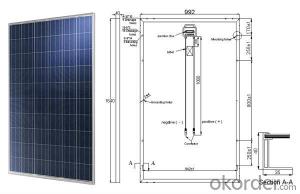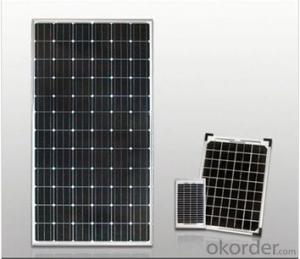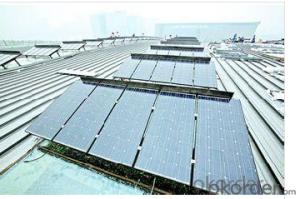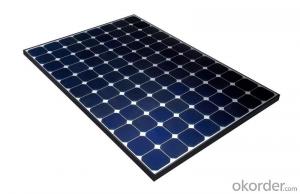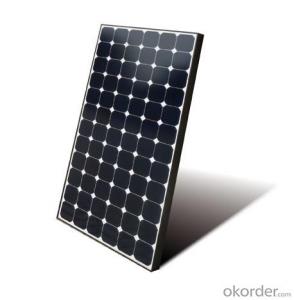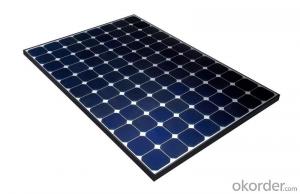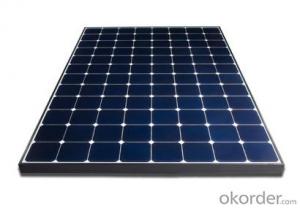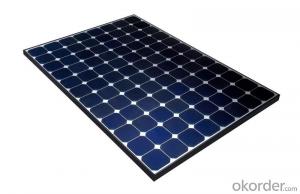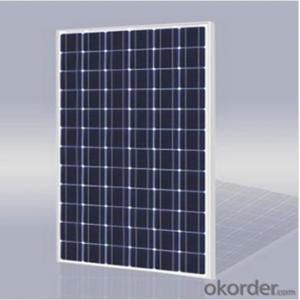Truck Solar Panels - CNBM Poly 190W Solar Panel with TUV UL CE Certificate for Residential
- Loading Port:
- Shanghai
- Payment Terms:
- TT OR LC
- Min Order Qty:
- 100 watt
- Supply Capability:
- 1000 watt/month
OKorder Service Pledge
OKorder Financial Service
You Might Also Like
Specification
CNBM Poly 190W Solar Panel with TUV UL CE Certificate For Residential
Introduction
Electrical connections are made in series to achieve a desired output voltage and/or in parallel to provide a desired current capability. The conducting wires that take the current off the modules may contain silver, copper or other non-magnetic conductive [transition metals]. The cells must be connected electrically to one another and to the rest of the system. Externally, popular terrestrial usage photovoltaic modules use MC3 (older) or MC4 connectors to facilitate easy weatherproof connections to the rest of the system.
Each module is rated by its DC output power under standard test conditions, and typically ranges from 100 to 365 watts. The efficiency of a module determines the area of a module given the same rated output – an 8% efficient 230 watt module will have twice the area of a 16% efficient 230 watt module. There are a few solar panels available that are exceeding 19% efficiency. A single solar module can produce only a limited amount of power; most installations contain multiple modules. A photovoltaic system typically includes a panel or an array of solar modules, a solar inverter, and sometimes a battery and/or solar tracker and interconnection wiring.
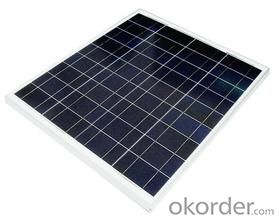
Suggested application
Home lighting business lighting,
Garden lighting, pavement lighting
Farmer household lighting
Decorative water pump
Traffic signal lighting
Industry area
Business area
Solar Power Plant
Product feature
Modules are made of Monocrystalline or Polycrystalline Silicon cell.
Materials and color of the solar panel frame: Clear anodized aluminum alloy type 6063T5 Universal frame; Silver-white color;
The output connection gathers the coupling: Selects conforms to the IEC-612615; 2005, class II, IEC61730 international standard; Airtight waterproofing binding clamp;
Module seal structure: The surface is thick, the high diaphanous rate armored glass with solar cell board special-purpose 3.2mm becomes after the high temperature lamination craft. The back selects has waterproof and anti- aged performance fine TPT materials. The entire block battery board has, the waterproofing, the anti- aging airtight and so on the fine performance;
Power tolerance: +/-3%
Packaging
International standard cartons (according to the requirements of customers)
- Q: What is the main material for making solar panels?
- You can also according to their own needs, according to the power to buy a good package of solar photovoltaic products.
- Q: How do solar panels affect the power grid?
- Solar panels can positively impact the power grid by producing clean and renewable energy. When connected to the grid, excess electricity generated by solar panels can be fed back into the system, reducing the overall demand for traditional fossil fuel-based power sources. This not only helps in reducing greenhouse gas emissions but also decreases the strain on the power grid, making it more reliable and sustainable.
- Q: Didnt solar panels use to cost around $250,000 5 years ago?
- I okorder to register for free and lock in long term costs. The increasing demand and competition is helping reduce costs.
- Q: Can solar panels be used for agricultural purposes?
- Yes, solar panels can be used for agricultural purposes. They can provide electricity for various agricultural operations such as irrigation systems, lighting, and powering machinery. Additionally, solar panels can be used to generate clean energy to reduce the carbon footprint of farming practices.
- Q: Is it possible for a 2V rated panel to charge a bank of batteries equal to around 36V? I believe that the panels should equal or exceed the voltage of the batteries but, I'm not for certain.
- you'll have to use 3 panels connected in series or use a dc to dc up converter, the former is a better option
- Q: Can solar panels be used for street lighting?
- Yes, solar panels can be used for street lighting. By harnessing the energy from the sun, solar panels can power street lights, eliminating the need for electricity from the grid and reducing carbon emissions. Solar-powered street lighting systems are increasingly being adopted as a sustainable and cost-effective solution for illuminating streets and public spaces.
- Q: What is the lifespan of solar panel batteries?
- The lifespan of solar panel batteries can vary depending on various factors such as the type of battery, its quality, and usage patterns. Generally, solar panel batteries are designed to last between 5 to 15 years. However, with proper maintenance and care, some batteries have been known to last even longer.
- Q: Have a 20V 40W solar panel and it is attach to two backup batteries. Just want to know know how many watt of inverter do I need?
- It depends on what you want to run from the panel. A 20W inverter might last a long time, but would not run much. A 00W inverter might run down your batteries in a few hours. It might help if you posted how much capacity (Volts, Amp-Hours) the batteries have.
- Q: Can solar panels be used to power a sports stadium?
- Yes, solar panels can be used to power a sports stadium. By installing a sufficient number of solar panels on the stadium's roof or surrounding areas, the captured solar energy can be converted into electricity to power various systems within the stadium, including lighting, heating, ventilation, and other electrical equipment. This can reduce the reliance on traditional energy sources and provide a more sustainable and environmentally friendly solution for powering sports stadiums.
- Q: i trying to make a solar panel. right now i dont have money to go and buy a copper sheet. so can i make it out of aluminum foil. if there is a way please tell me how. and what do i use for wires. i making this to charge batteries.
- No but look in youtube for other ways of charging batteries . There is allot of neat ideas like building a small wind generator from scrap parts such as old speaker magnets copper wire out of transformers things that most people toss in the junk .
Send your message to us
Truck Solar Panels - CNBM Poly 190W Solar Panel with TUV UL CE Certificate for Residential
- Loading Port:
- Shanghai
- Payment Terms:
- TT OR LC
- Min Order Qty:
- 100 watt
- Supply Capability:
- 1000 watt/month
OKorder Service Pledge
OKorder Financial Service
Similar products
Hot products
Hot Searches
Related keywords
